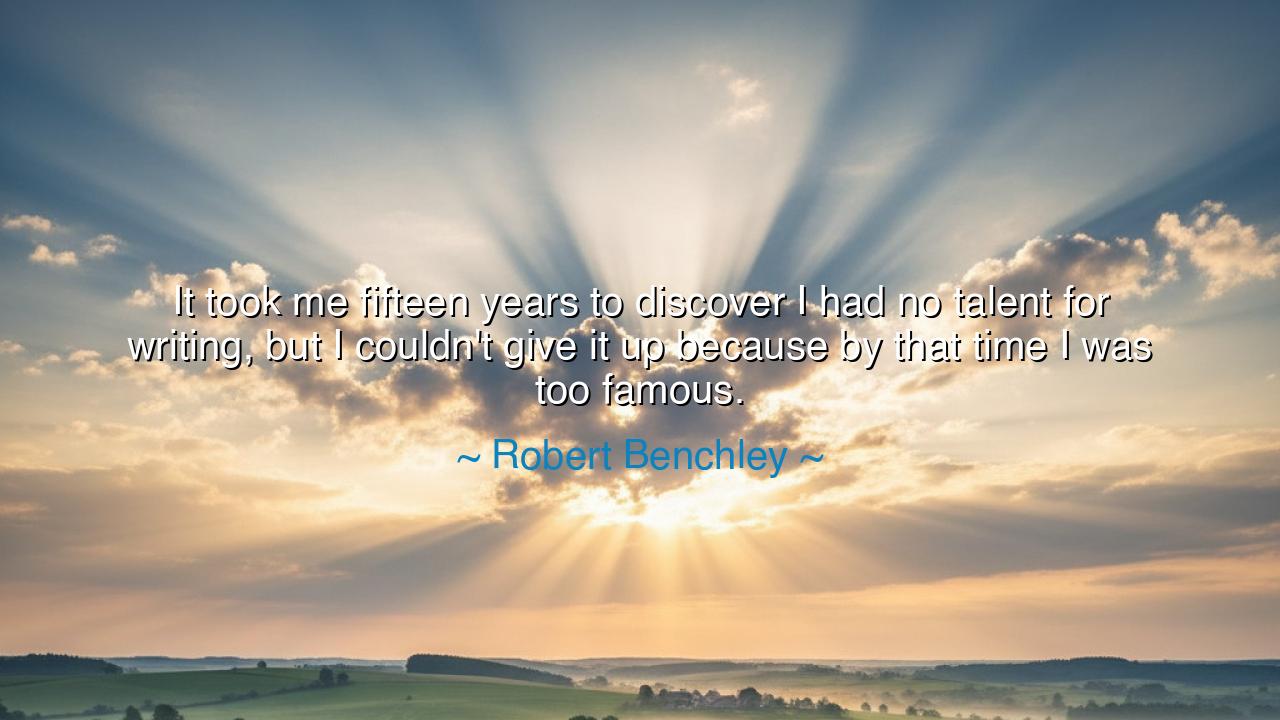
It took me fifteen years to discover I had no talent for writing
It took me fifteen years to discover I had no talent for writing, but I couldn't give it up because by that time I was too famous.






The soft murmur of the café filled the air, blending with the rhythmic tapping of rain against the window. Jack sat across from Jeeny, his coffee cup cradled in his hands, his gaze drifting out toward the rain-soaked streets. Jeeny, sitting opposite him, seemed lost in thought, her fingers tracing the rim of her cup.
Host: After a brief moment of silence, Jeeny spoke, her voice thoughtful, with a touch of amusement.
Jeeny: “I came across a quote from Robert Benchley today that made me smile. He said, ‘It took me fifteen years to discover I had no talent for writing, but I couldn’t give it up because by that time I was too famous.’ What do you think he means by that? Do you think fame can sometimes trap people into continuing something even when they know they’re not great at it?”
Jack: He looked up, a chuckle escaping him. “I think Benchley is hitting on something humorous but also true about the pressures of fame. Once you reach a certain level of recognition, there’s a sense that you have to keep going, regardless of whether or not it’s still working for you. Fame can lock you in—you’re expected to live up to a certain image, even if deep down you know you’re not suited for it anymore. It’s not necessarily about the love for writing; it’s about the identity that fame creates.”
Jeeny: “Yes, exactly. There’s this external pressure that can make it hard to step away from something—even if it’s not bringing you joy or fulfilling your purpose. It’s like the weight of expectations pushes you to keep going, even when you might be questioning whether it’s the right path anymore. In Benchley’s case, he probably felt this obligation to continue because his name had become synonymous with something he didn’t even feel aligned with anymore. And that can be a powerful trap.”
Host: The rain outside had softened, leaving a quiet stillness between them. Jack shifted slightly, his fingers still resting on his coffee cup as he continued.
Jack: “That’s the irony, isn’t it? Fame, which is often sought after for its freedom, can end up being one of the most confining things. Instead of giving you the freedom to explore, create, or change, it often forces you to keep doing what you’ve become known for, even if it no longer serves you. It takes a lot of courage to pivot when the world expects you to stay in the same lane.”
Jeeny: “Exactly. And sometimes, the real growth happens when we can look at something honestly and admit, ‘This is no longer my path.’ It takes a lot of self-awareness to recognize that, especially when your identity is so tied to your public image. I think that’s why so many people in the public eye end up stuck in cycles—because they fear stepping out of the spotlight or changing the narrative. Benchley’s quote is funny, but it also reflects how fame can create this paradox where people are more focused on their public image than their personal happiness or true calling.”
Host: The conversation seemed to deepen, as they both reflected on the complexities of fame. Jack set his coffee cup down gently, his expression softening.
Jack: “I think Benchley’s quote also highlights the human side of fame—the vulnerability that comes with it. Even someone who’s famous can still feel lost or disconnected from what they’re doing. Fame can sometimes create a pressure to perform, to keep up an image, and it becomes harder to escape from that role once you’ve built it. The real challenge is being able to detach from that and make a change when you realize it’s not working for you anymore.”
Jeeny: Her smile was small but filled with understanding. “Exactly. It’s about finding the freedom to step away from something, even when the world is telling you to keep going. And sometimes, true success is about being able to look at yourself and say, ‘This isn’t the direction for me anymore.’ Benchley’s humor is a reminder that it’s okay to evolve, even if it feels like you’re supposed to stay the same.”
Host: The rain had stopped, leaving a quiet calm in the café. Inside, Jack and Jeeny sat in the realization that fame and public expectation can sometimes keep us trapped in roles we no longer identify with. Robert Benchley’s words remind us that the courage to change—no matter how famous we become—is key to personal growth. It's about recognizing when it's time to let go of what no longer serves us and embrace new paths, even if they’re uncertain. Fame, after all, can’t dictate what makes us truly fulfilled. Only we can do that.






AAdministratorAdministrator
Welcome, honored guests. Please leave a comment, we will respond soon